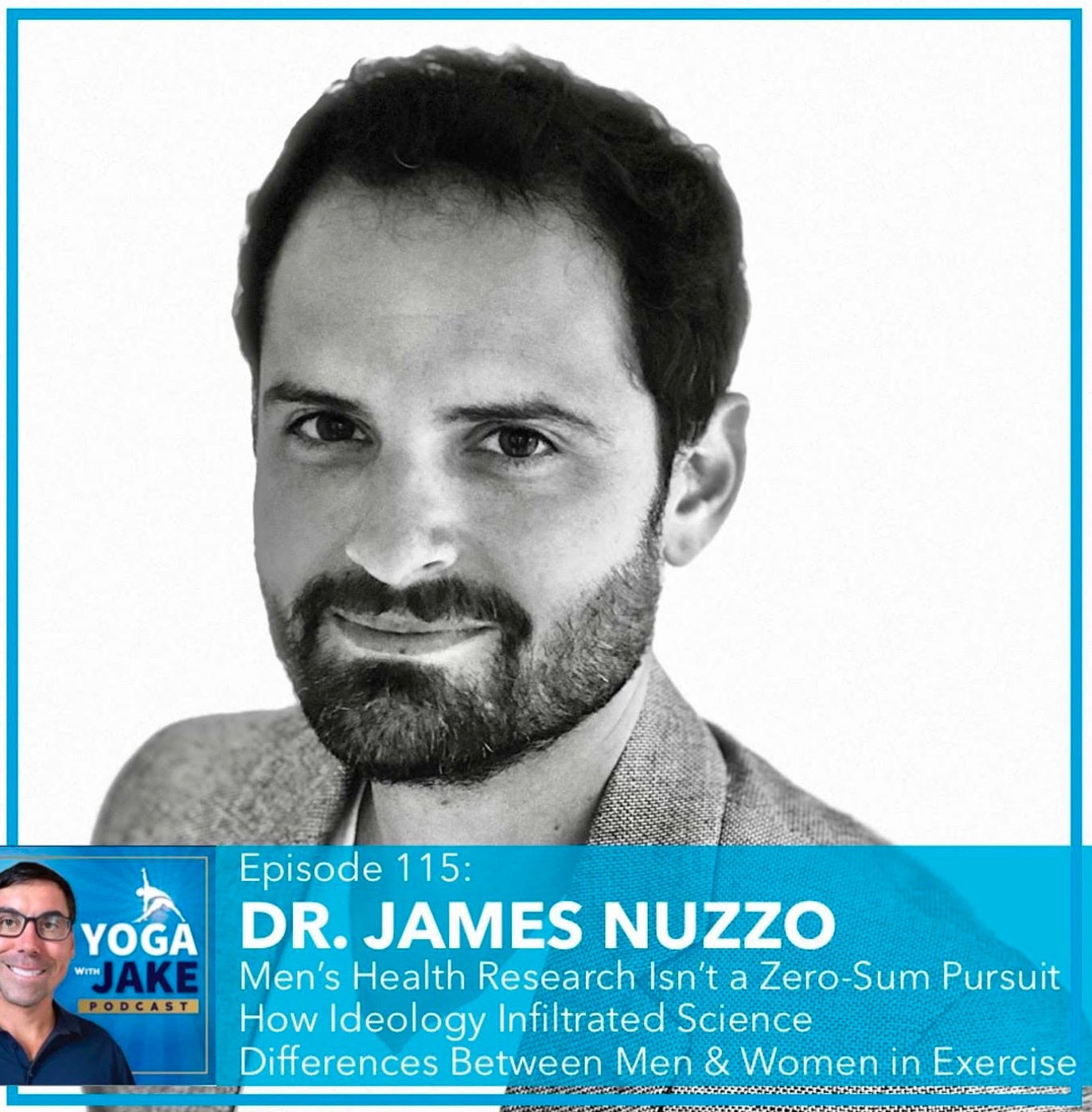THE NUZZO LETTER IN THE NEWS
(See my commentary and response to critics on X here)
Episode 115: Dr. James Nuzzo on the Yoga With Jake Podcast
Yoga With Jake
Episode description: Discussion about sex differences in exercise, how gender ideology impacts science, and how men's health research isn't a zero-sum pursuit.
ARTICLES AND ESSAYS
The Coalition to End Domestic Violence
2025 Federal Election Priorities
Exercise and Sport Sciences Australia
I Had a Sex Dream About My Therapist. Was She Right to Be Upset? She Said I Could Tell Her Anything
New York Times
Final Report – Volume 3: Military sexual violence, unacceptable behaviour and military justice
Royal Commission into Defence and Veteran Suicide
Military sexual violence, discusses the evidence and accounts we received on the devastating effects of military sexual violence. We look at changes the Australian Defence Force (ADF) has made to combat the problem, and that despite these changes, prevalence remains high: Defence’s own figures show that close to 800 sexual assaults have been reported in the ADF over the past five years, in the context of an estimated under-reporting rate of 60%.
Reinventing the Letter to the Editor in Science: A Dedicated Preprint Server
Publishing Research Quarterly
Abstract: Although letters to the editor (LTEs, or Correspondence) have a wide range of communicative functions within science, they also present several drawbacks, three of which we highlight: editorial ambiguity, technological limitations and skewed perceptions about their format. An assessment of Scopus (September 16, 2023) indicated that letters account for 1.7% to 3.2% per year, relative to articles and reviews, suggesting that the LTE field is undeveloped. We argue that the creation of a new preprint server, which we name CoArXiv or LettersArXiv, would allow LTEs—with timely and valuable knowledge and insight—to be posted in much the same way as other preprints, and would be one way to overcome needed reform of LTE-publishing culture, ultimately expanding the range of science communication channels for multidisciplinary research. We consider that such a preprint server would offer three major benefits for scientific research: format-free ease of swift communication, increased author visibility and accountability, and avoiding the homelessness of unpublished LTEs.
HISTORICAL ARTICLES AND ESSAYS
Women Firefighters: The Gender Boondoggle
LA Weekly, 2008 (cited in this recent essay at The Fiamengo File)
International Archives of Occupational and Environmental Health, 2018
Abstract: Purpose: Although individual studies have reported high prevalence of musculoskeletal symptoms (MSS) among construction workers, no systematic review has summarized their prevalence rates. Accordingly, this systematic review/meta-analysis aimed to synthesize MSS prevalence in different construction trades, gender and age groups, which may help develop specific ergonomic interventions. Methods: Nine databases were searched for articles related to the research objective. Two reviewers independently screened citations, extracted information and conducted quality assessment of the included studies. Meta-analyses were conducted on clinical and statistical homogenous data. Results: Thirty-five out of 1130 potential citations were included reporting diverse types of period prevalence and case definitions. Only the 1-year prevalence rates of MSS (defined as at least one episode of pain/MSS in the last year) at nine anatomical regions had sufficient homogeneous data for meta-analysis. Specifically, the 1-year prevalence of MSS was 51.1% for lower back, 37.2% for knee, 32.4% for shoulder, 30.4% for wrist, 24.4% for neck, 24.0% for ankle/foot, 20.3% for elbow, 19.8% for upper back, and 15.1% for hip/thigh. Female workers demonstrated a higher prevalence of MSS while there was insufficient information on the prevalence of trade-specific or age-related MSS. The quality assessments revealed that many included studies estimated prevalence solely based on self-reported data, and did not report non-respondents' characteristics. Conclusions: Lumbar, knee, shoulder, and wrist MSS are the most common symptoms among construction workers. Future studies should standardize the reporting of period prevalence of MSS in different construction trades to allow meta-analyses and to develop relevant MSS prevention program.
RUBBISH BIN
The case for administrative postdocs
University Affairs
Research as resistance: Naming and dismantling the master narrative of “good” science
American Psychologist
Abstract: The call for psychological science to make amends for “causing harm to communities of color and contributing to systemic inequities” (American Psychological Association, 2022a) requires a critical acknowledgment that science itself is not neutral but a sociopolitical and ideological endeavor. From its inception, psychology used science to produce what was framed as incontrovertible “hard” evidence of racial hierarchy, infallible “proof” that white people (i.e., cismale, heteronormative, and economically resourced white people) were superior to Indigenous and Black people. We first trace the historical links between postpositivist epistemology and the ideology of white supremacy in psychological science, showing that although explicitly racist science (e.g., eugenics) has faded, the widely shared and strictly enforced epistemological norms about what is (and is not) “good” science remain entrenched. We then outline three epistemic imperatives to resist this harmful master narrative: (a) embrace humanizing epistemologies, (b) listen and learn from those who have been systematically left out of science, and (c) recognize resistance as normative and necessary. We discuss how these imperatives, rooted in critical, feminist, and antiracist scholarship, disrupt oppression and guide us toward doing science that does good.
SUPPORT THE NUZZO LETTER
If you appreciated this content, please consider supporting The Nuzzo Letter with a one-time or recurring donation. Your support is greatly appreciated. It helps me to continue to work on independent research projects and fight for my evidence-based discourse. To donate, click the DonorBox logo. In two simple steps, you can donate using ApplePay, PayPal, or another service. Thank you!
If you prefer to donate to a specific project, please see the Go Fund Me page for my current research on sex differences in muscle strength in children.










Great stuff! Thanks for this important work. Boys need to know that they are stronger than girls, on average, throughout the lifespan.
Thank you for bringing this to my attention. This is very important work. Must include this in my child development classes.